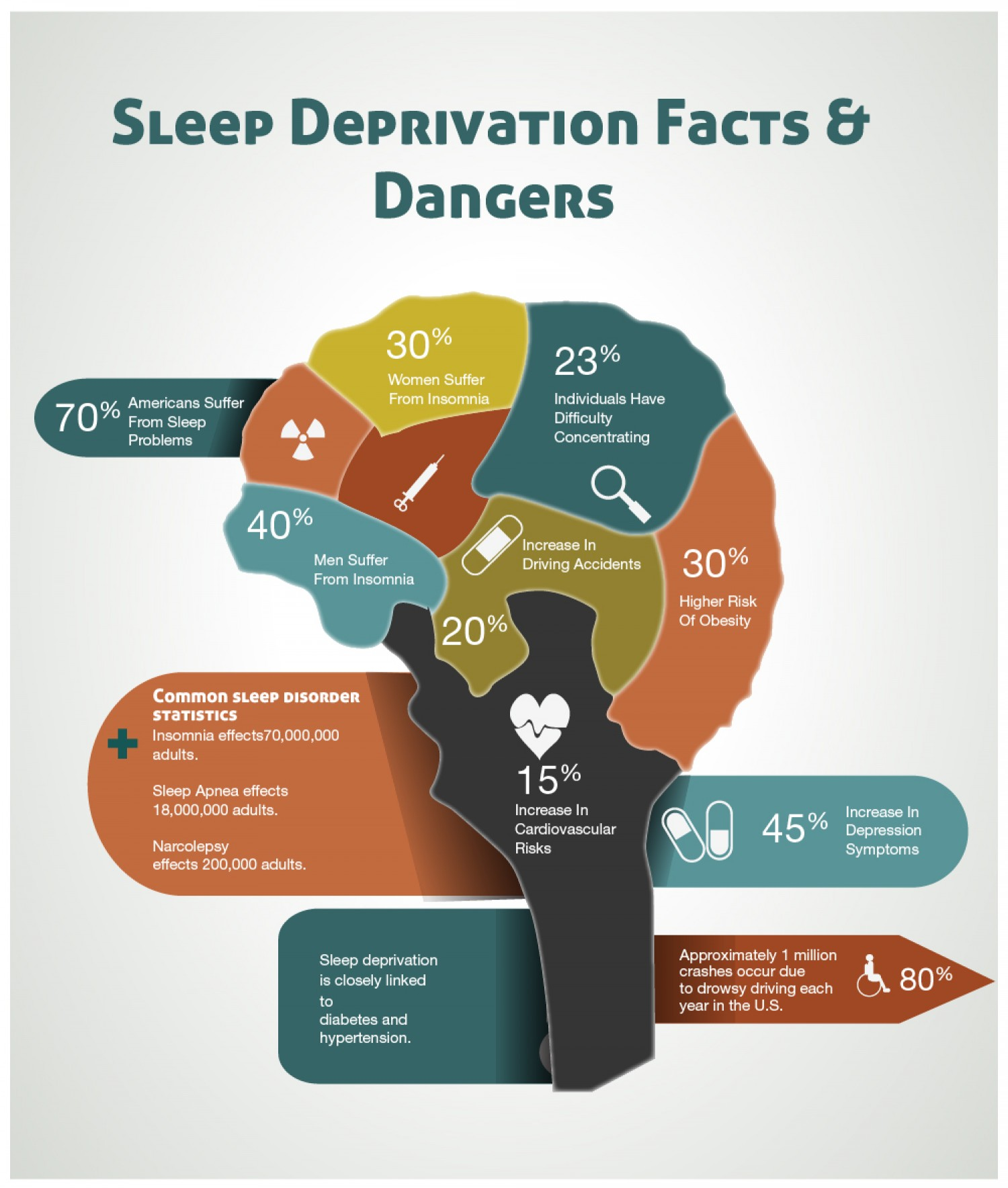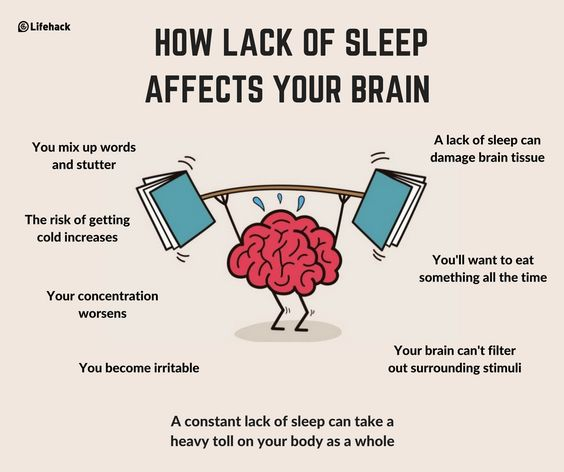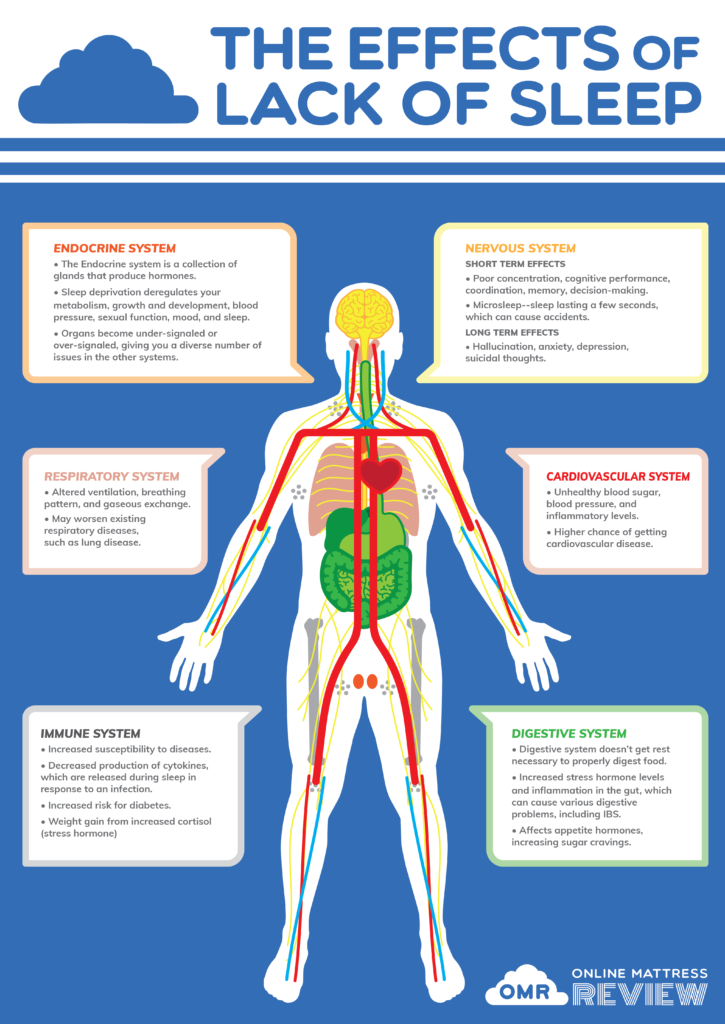Negative Side Effects Of Sleep Deprivation
Negative Side Effects Of Sleep Deprivation
Imagine the morning when the alarm goes off and you are ready to jump out of bed and get after the day ahead and don’t feel every cell in your body crying to reach for the snooze button. You don’t feel groggy, short-tempered, or desperate to dive headfirst into your first pot of coffee. If this scenario seems like a distant dream, you’re probably sleep-deprived.
You know the sleep deprivation is real when the first question you get asked on the first meeting of the day is, “how much sleep did you get last night?”
The consequences of sleep deprivation are alarming and poor sleep hygiene is to blame. Chronic sleep deprivation can take up to 16 years off your life. Understanding sleep and the vital role it plays in our overall health and well-being is the first step to making it a priority.
If you think you need more sleep, you’re probably right. Every system in our body is impaired by sleep deprivation.
Adequate sleep sets a strong foundation for your physical, mental, and emotional health.
Chronic Sleep Deprivation
Chronic sleep deprivation is the result of consistently not getting enough sleep both in quality and duration. From weight gain to an increased risk of heart attack, learning the dangers of consistently missing sleep is important.
Lack of sleep can lead to:
- Increased appetite and related weight gain
- Hormone fluctuations
- Lowered fertility
- Decreased immune function
- High blood pressure
- Increased risk of type 2 diabetes
- Increased risk of heart attack and stroke
- Increased risk of mortality
- Increased risk of seizures
- Increased risk of type 2 diabetes
- Lowered sex drive
- Muscle soreness and aching
- Overall fatigue
All the above results in a lower quality of life and a less than the optimal version of ourselves to be present and able with loved ones.
“You may or may not realize it, but sleep is the foundation for everything we do. Proper, healthy sleep is one of the most basic things that can either hold you back or propel you forward towards your goals- whether they’re fitness related, intellectual, professional, or even emotional goals.” – Jonathan Levi
Not Getting Enough Sleep
As humans, we understand the body by breaking it down into separate systems, when in reality, the body functions as a whole. Everything affects everything.
Through Integrative medicine, we now know that giving someone a medication for their nerve pain will then impact their ability to sleep which serves as a domino effect leading to insulin sensitivity, cravings, poor nutrition, decreased energy level, and exercise.
The list goes on.
We know for a fact that insufficient sleep is a contributor to poor physical health, mental health, and emotional health.
However, it is helpful to understand how sleep deprivation will impact each system of the body and how one negative side effect in one system of the body will lead to another in a different system of the body.

The Cardiovascular System
The heart is the power source for the cardiovascular system. It ensures that the body is getting adequate oxygen as it pumps blood throughout all of our organs and tissues.
Cardiovascular disease continues to become one of the top causes of death. It is known that poor diet, smoking, and obesity are all major contributors to conditions like coronary heart disease and other heart-related diseases. However, getting too little sleep is quickly becoming a big part of the conversation.
Fact: Coronary heart disease is the leading cause of death in the US.
It is also known as coronary artery disease as it is the result of a build-up of plaque (atherosclerosis) that inhibits the transportation of blood and oxygen throughout the body.
Chronic sleep deficiency increases the risk for:
- High blood pressure
- Heart attacks
- Diabetes
- Stroke
- Irregular heartbeat
- Hypertension
- High cholesterol
Alarming Facts According To National Sleep Foundation:
- People sleeping less than six hours per night had a 20% higher chance of heart attack (source)
- People with recurrent, unexplained chest pain have high rates of insomnia-like symptoms ( source)
- Obstructive sleep apnea (OSA) is a breathing disorder that is linked to heart disease
During periods of NREM sufficient sleep, blood pressure drops, heart rate slows, and breathing stabilizes, which allows the heart time to recover and recuperate from the stress of the day. Not getting enough sleep, won’t allow adquate recovery and increases the risks of hypertension, inflammation, and cardiovascular disease.
The Immune System
A key piece of health maintenance and therefore sickness prevention, is getting enough sleep. Not only is the immune system the hero when fighting off sickness, it also aids in healing wounds and warding off chronic disease.
To fight off common seasonal illnesses and any virus or bacteria, we need to prioritize sleep to enable our immune system, which has an innate and adaptive ability to be the defense powerhouse it was designed to be.
As our bodies sleep, our blood pressure and heart rate lower and our breathing stabilizes, allowing the immune system to work its magic. During sleep, the body is able to produce more cytokines. These cytokines enable the body to fight off infection and illness. The body responds by reaching a point of inflammation that would be detrimental to our mental and physical abilities if we were awake during this process.
Through self-regulation, this state of extreme inflammation reduces as our sleep cycle and circadian rhythm reset for the next morning. The body has evolved for this process to take place during sleep, which stresses the need for quality sleep. Getting enough high-quality sleep facilitates the delicate balance of immune function that is vital for both innate and adaptive immunity.
In addition to not getting quality sleep on a nightly basis, sleep disorders like sleep apnea, insomnia, and circadian rhythm disruption, can interfere with the healthy functioning of the immune
Sleep deprivation decreases the body’s ability to use its natural defense in fighting off illness. This is a result of the body not being able to produce cytokines and antibodies as it would during adequate, consistent sleep.
Better Sleep = Better Immune System
The Endocrine System
Our hormones are highly sensitive. One of the best regulatory practices for maintaining hormonal balance is proper sleep quality and quantity. Disruption of REM cycles can inhibit the body in its natural production of testosterone.
Several studies have evaluated the relationship between sleep and hormone levels. Showing that sleep deprivation greatly impacts the production and baseline levels throughout the body. Hormone regulation is a highly complex topic and like a domino effect, one imbalance can lead to several other imbalances.
Women especially experience the havoc of hormones and tend to fall victim to sleep deprivation, sleep disorders, and insomnia symptoms.
When a woman’s hormone levels spike or drop, such as during the menstrual cycle, during and after pregnancy, and especially around menopause, women can experience sleep loss and therefore show more symptoms of sleep deprivation.
It is key to ensure you’re doing your best to create the most ideal sleep environment and eliminate all sleep disturbances to maintain a consistent sleep-wake cycle during periods of high hormone fluctuation.
Hormones highly correlated with sleep:
- Growth hormone
- Thyroid Stimulating Hormone
- Melatonin
- Cortisol
- Leptin
- Ghrelin levels
Growth Hormone
Poor quality sleep can negatively impact human growth hormone levels.
Human growth hormone is released under conditions of sleep. In men, 60% to 70% of daily human growth hormone secretion occurs during early sleep which is typically when the deepest sleep cycles occur. While women spend about two times as much time during the day actively secreting growth hormone
Melatonin
Perhaps one of the more recognized hormones associated with sleep, melatonin plays a crucial role in regulating sleep patterns. It regulates neurotransmitters and calms your nervous system to initiate sleep.
Melatonin is produced in the brain through the Pineal Gland and then released into the bloodstream. When the sun goes down and our eyes recognize the darkness, the pineal gland is prompted to begin releasing melatonin. As the sun begins to rise and it becomes lighter, the production stops. Through this process, melatonin plays a huge role in regulating the circadian rhythm and maintaining consistent sleep-wake cycles.
The important role melatonin takes in getting a good night’s sleep has resulted in many desiring to supplement with it. It’s important to learn the side effects and proper supplementation doses. Speaking with a doctor and understanding the regulations of melatonin supplements on the market is suggested.
Tip: It’s important to allow our bodies to produce their own melatonin. The typical melatonin supplement is at least 1mg when our bodies produce 6 micrograms (µg) of melatonin; a fraction of that.

Thyroid Stimulating Hormone
This hormone is responsible for controlling the way other hormones function. Sleep duration and sleep quality are major contributors to sustaining normal function all around. It is also known as thyrotropin. When not getting enough quality sleep, there is a significant increase in thyroid hormone. Thyroid-stimulating hormone is a pituitary hormone that stimulates the thyroid gland that produces two other hormones that stimulate the metabolism of every cell in the body.
Sleep deprivation can result in thyroid dysfunction, which can lead to an array of other problems.
Thyroid disfunction causes:
- Fatigue
- Puffy Skin
- Weight gain
- Muscle weakness
- Digestion issues
- Dry skin
- Memory impairment
- Hair loss
- Elevated cholesterol
- Inflammation
- Depression
- Sleep problems
Subcutaneous Fat
Subcutaneous fat is an endocrine organ, which means it plays a huge role in hormone regulation. The amount of subcutaneous fat we have is determined by hormone regulation. Hormone regulation is highly dependent on getting enough sleep, both in quality and duration.
So, you can see how sleep deprivation may lead to some issues here when it comes to monitoring fat and signaling the proper hormones. This is where leptin comes in.
Leptin is the body fat census tracker. It’s job is to let the brain know how much body fat you currently have as a means of survival.
When the body is sleep deprived, it’s sensitivity leptin decreases. Meaning you’re going to need more leptin to get the proper signal to the brain.
Just after missing two hours of sleep, your body is 30% less sensitive to sleep.
Sleep deprivation can be a cuplrit for weight gain because when the brain’s sensitivity to leptin is down due to lack of sleep, it thinks we need to store more than what is usually necessary.
Insulin is also hugely impacted when the body is sleep deprived. Getting less sleep can lead to more intense cravings for sugar and carbs throughout the next day. This can become a vicious cycle causing fat gain.
The Digestive System
The most serious potential health consequences that are associated with low quality sleep and too little sleep will impact every system in the body.
Like a domino effect, when one area of the body is negatively impacted due poor sleeping habits, it will lead to other negative health conditions throughout other body systems.
As we talked about above, sleep deprived people are at higher risk for gaining weight. The release of insulin decreases when there is sleep insufficiency. When there is less insulin, blood sugar regulation gets out of whack.

The Central Nervous System
Imagine one of the main highways of your hometown having road blocks and obstacles to get through at every mile. You’re still able to use this road as a means of transportation, but it’s not as effective or efficient. This is what happens to our central nervous systems when we sleep deprived.
Our bodies ability to send, process, and store information is disrupted on not enough sleep. Every region of the brain that harnesses our control feelings, thoughts, emotions, and behaviors is dysfunctional when we feel tired.
It has been said that sleep deprivation can lead to or worsen mental illness. Right now, the recommendations for adults is to get eight hours of sleep. Although there are some sources that range between 7-9 hours of sleep, 8 hours is a fantastic goal.
Sleep deprivation can also lead to other mental health problems:
- Hallucinations
- Heightened anxiety
- Increased stress
- Paranoia
- Impulsive behavior
- Suicidal thoughts
If having trouble sleeping because a chronic, consistent occurrence, the brain will begin to experience micro sleeps. The brain rapidly switched between wakefulness and being asleep in a matter of seconds. Drowsy driving has become one of the top contributors to death, especially teen drivers.
Sleep deprivation is a risk factor for an increased chance to experience cardio cerebral vascular events.
Some cerebrovascular diseases include:
- Stroke
- Carotid stenosis
- aneurysms
All being a result of restrictions and blockage to blood flow throughout the blood vessels that are pathways to the brain and heart
Sleep Disorders
If you are unsure if you have a sleep disorder, here are some questions to ask yourself that may help you figure that out.
- Are you struggling to fall or stay asleep?
- Do you sleep walk or sleep talk?
- Do you snore/gasp for air/choke while asleep?
- Does it take 30 min or more to fall asleep on a nightly basis?
- Do you experience excessive movement while asleep?
There are three main categories of sleep disorders:
- Sleep-related breathing disorders
- Sleep-wake disorders
- Neurologial sleep disorders
Although all are associated with poor sleep, insufficient sleep, and sleep deprivation, the distinction is important because underlying causes and organs involved differ.
Sleep-related breathing disorders are linked to the respiratory system.
Neurological sleep disorders are associated with the nerves within the body that are triggered during sleep or inhibit the body to fall and stay asleep.
Sleep-wake disorders are linked to how “in or out of tune” the body is to its biological circadian rhythm. When the body’s circadian rhythm is off, so are hormones.
Common sleep disorders:
- Insomnia
- Parasomnia
- Hypersomnia
- Sleep apnea
- Circadian Rhythm disorder
- Restless legs syndrome
Not only do these sleep disorders can cause grogginess in the morning, daytime tiredness, sleepiness, irritability, depression, and anxiety, but they can put you at higher risk to develop disease and other health conditions.
It is highly recommended that you see a sleep specialist if any of the above questions and/or symptoms resonate with you.
Lifestyle is a huge part in maintaining sleep and overall health.
Some things to consider when wanting to check in on your lifestyle:
- Diet: an anti-inflammatory diet
- Hydration: Drink a lot of pure water ( this doesn’t include sugary drinks)
- An active lifestyle: move often
- Proper supplementation
- Healthy interpersonal relationships
- A top notch night-time/sleep hygiene routine– Check out Doc Parsley’s Sleep Journal
Take Action Now
Sleep is the single most effective thing we can be doing to reset our brains and bodies. A good night’s sleep on a consistent basis is an active fight against disease control and facing the crippling effects of sleep deprivation. Even the most acute sleep deprivation can cause adverse health conditions.
Most adults have a sleep deficiency and don’t prioritize an adequate sleep schedule. As a society, we need to prioritize sleep. This is the first step in taking control of your quality of life. When our kids see us prioritizing sleep, our high school students will realize the importance in doing the same. Educating our kids on how staying up on electronic devices can inhibit the brain and body from falling asleep and induce stress and anxiety is a great place to start!
Ensure you and your family set up a sleeping environment that will allow the best possible sleep on a nightly basis. This means:
- Removing electronic devices
- Limiting outside noise
- Dark and cool room
Check out Doc Parsleys Stress Free Sleep Worksheet
Check out Doc Parsley’s Sleep Remedy and read about why the natural formula of Sleep Remedy is so effective.
